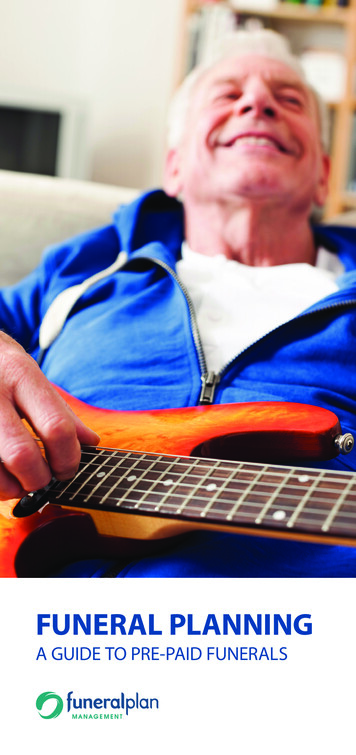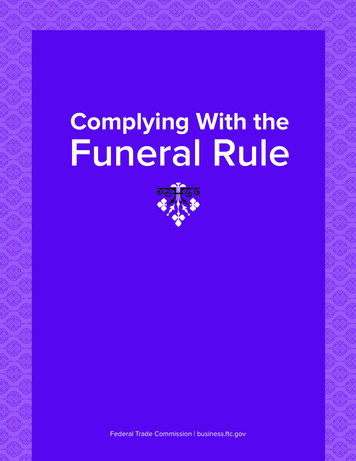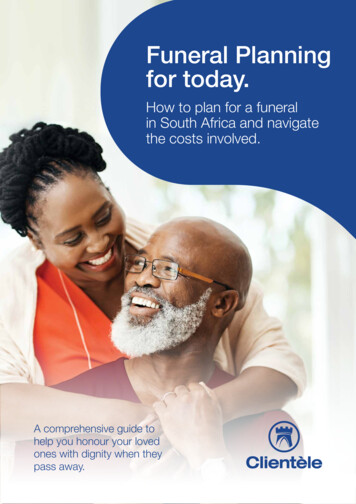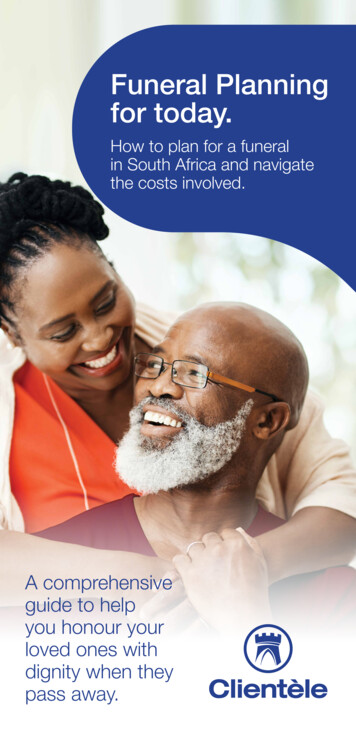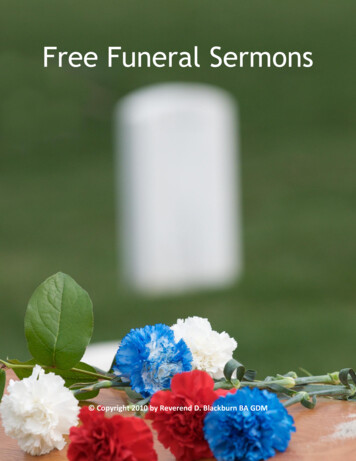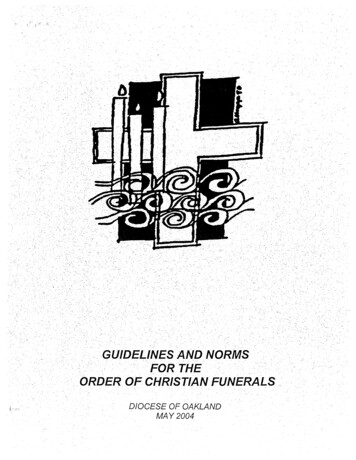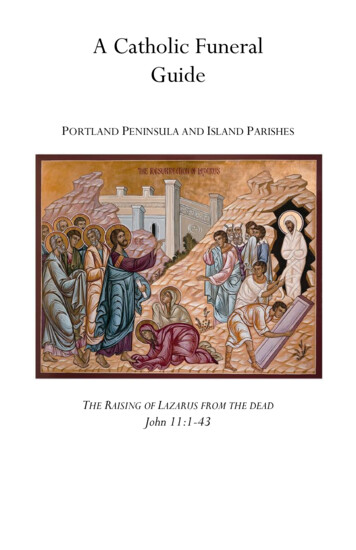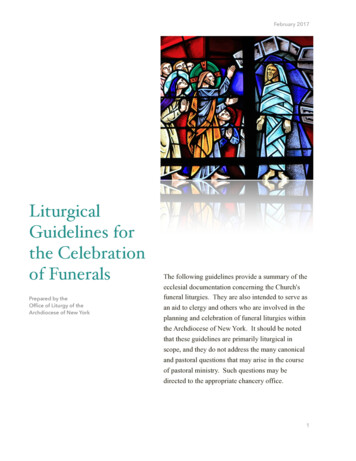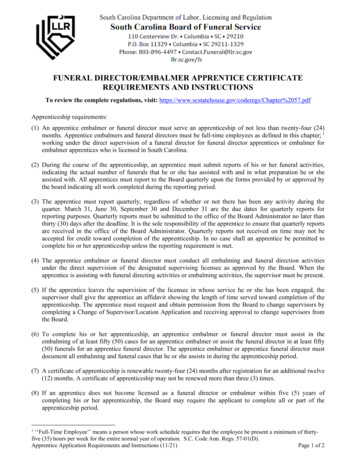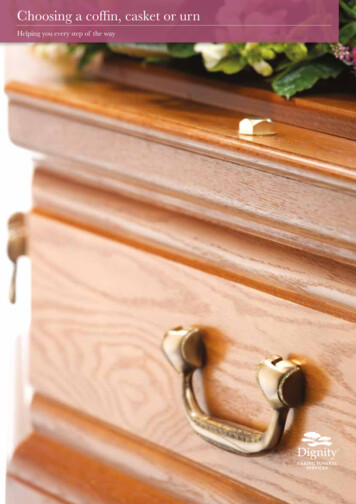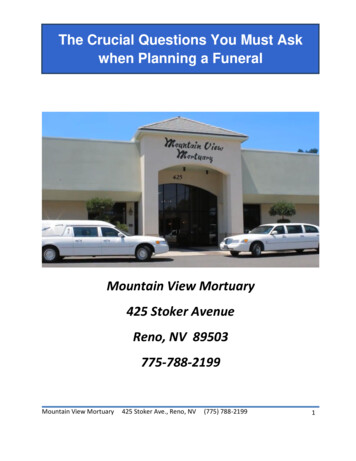
Transcription
Life InsuranceFuneralPlanning GuideWhat you need to know
IntroductionSince a will is usually not readuntil after the funeral, it’s nota good place to indicate yourfuneral preferences. It’s alsonot a good idea to put the onlycopy of your Funeral PlanningGuide in your safe deposit box,since your family may not haveimmediate access to the boxfollowing your death.Throughout your life, you’ve been a source of emotional, physicaland financial support for your family members and friends. Withour Funeral Planning Guide, you can help support your loved onesat a time when they need it most. By documenting your funeralpreferences, as well as other key information for your survivors,you can provide support posthumously — a final act of love.Grieving family members and friends may be confronted with dozens of funeral planningdecisions — all of which typically must be made quickly and under great emotional duress.What kind of funeral should it be? What funeral provider should you use? Should you buryor cremate the body? What other arrangements should you plan? Whom should you notify?And, as unpleasant as it may sound, how much is it all going to cost, and where will the moneycome from to pay for it? Knowing and following your wishes can alleviate the decision-makingstress, and allow your loved ones to focus on their emotional needs and on other family mattersthat may arise during difficult times. Following the funeral, your financial affairs will need to befinalized, and the information you provide for your loved ones will be invaluable in completingthis task.This Funeral Planning Guide provides an easy-to-use format for documenting informationyour loved ones will need after your death: The “My Personal Information” section allows you to record details your family will needfor official records but that, in their grief, they may not be able to recall. The “My Funeral Plans” section makes it simple to detail your wishes regarding yourfuneral. Should you not wish to plan your own funeral, your loved ones can use thisinformation to do it for you. The “My Important Contacts and Information” section provides a place for you to recordkey information your loved ones may need following your death, such as insurance andfinancial information.The Guide also provides you and/or your loved ones with information on funeral planning and onestate settlement, as well as descriptions of MetLife benefits that may be available to youor your beneficiaries, and a list of additional resources you may need.Once you have completed the Funeral Planning Guide, it can be saved to your computer. As abackup, we recommend printing it out to keep with your other important papers. You may wantto use the guide to initiate conversations with your family about other end-of-life issues, as well.In any event, be sure to let your family know where this information can be found, should theyneed it.** Note: MetLife neither captures nor stores any of the preferences or personal information youenter in the Funeral Planning Guide. MetLife is not responsible for retention or communicationto any third party of the contents of your Funeral Planning Guide. MetLife suggests printing thecompleted guide and saving it in a secure place with your other important personal informationand documentation. This Planning Guide is provided to you for informational purposes only anddoes not intend to cover all aspects of your specific circumstances. MetLife nor any of its affiliates,employees or representatives provide specific tax or legal advice. Please consult an attorneyregarding your own personal situation.
Funeral Planning GuideTable of Contents2239I. My Personal InformationA. Death Certificate InformationII. My Funeral PlansIII. My Important Contacts and Information9A. Key Contacts11B. Insurance Information12C. Important Information15IV. Funeral Planning Information15A. Prepaying15B. Preplanning15C. The Funeral Rule16D. Types of Funerals16E. Funeral Costs18F. Paying for the Funeral18G. Funeral Terms and Tips1921V. Settling the EstateVI. MetLife Benefits for You and Your Beneficiary(ies)21A. How do you know if you have enough life insurance to meet your family’s needs?22B. Face-to-Face Will Preparation22C. Face-to-Face Estate Resolution ServicesSM(ERS)22D. WillsCenter.com23E. Grief Counseling23F. MetLife Delivering The Promise (DTP)23G. Total Control Account (TCA)24VII. The MetLife Death Claim Process25 VIII. Additional Resources1
2I. My Personal InformationA. Death Certificate InformationYour loved ones will need the following information about you in order to obtain a death certificate:Full Legal Name:First NameMiddle NameLast NameSuffix (Sr., Jr., III, etc.)Last NameSuffix (Sr., Jr., III, etc.)Other Names By Which You May Be Known:First NameMiddle NameSocial Security Number:Date of Birth:City & State of Birth:Ethnic or Cultural Heritage:Your Maiden Name:Mother’s Maiden Name:Father’s Name:Marital Status: Married Never Married Widowed DivorcedSpouse / Domestic Partner Name:Wedding / Registration Date & Place:Your Children:First NameMiddle NameWere you ever in the Armed Forces?If Yes, What Branch or Country: YesLast Name NoDate of BirthCity & State of Birth
Funeral Planning GuideEducation:High SchoolNameCity & StateHighest Grade Completed orDegree EarnedCity & StateHighest Grade Completed orDegree EarnedCollegeNameOther Personal Identification NumbersDriver’s License # / State:Visa #:Passport # / Issuing Country:Green Card #:II. My Funeral PlansRecord your final wishes below to assist your grieving family in making the final arrangements you desire. This information willprovide a “road map” your loved ones can follow to memorialize your life. Knowing they are fulfilling your final requests will givethem peace of mind during a very difficult time.People I’d like personally notified of my death:Name:Phone #:Name:Phone #:Name:Phone #:Name:Phone #: I have a prepaid funeral plan:Provider’s NameAddressPhone NumberPlan # or Other IdentifierName of Cemetery & Plot #Location of Documents3
4 I do NOT have a prepaid funeral plan. I would like my funeral to be in accordance with the preferences I’ve documented below:Arrangements should be made by (select all that apply): My Spouse My Father My Mother My Children A Sibling OtherI would like my remains to be handled as follows: Ground burial in a private cemetery (specify): I have purchased a plot (specify plot #): I have not purchased a plot Interred in a national cemetery (eligible veterans, and eligible family members) Interred in a mausoleum (specify): I have purchased a crypt (specify #): I have not purchased a crypt Cremation, with cremated remains (ashes): Interred in mausoleum (niche) Interred in burial plot Scattered (specify where — check local, state and federal laws) Other (please explain) I have registered to donate my body/organs to (specify): They will return my remains (ashes), which should be: Interred in mausoleum (niche) Interred in burial plot Other (please explain)I would like a: Traditional funeral, followed by burial or cremation Direct burial or cremation, followed by a memorial service Direct burial or cremation, no memorial service Other (please explain) Cremation
Funeral Planning GuideTraditional Funeral/Memorial Service PreferencesVisitation and viewing preferences (if applicable): At the funeral home At place of worship Open casket Viewing only at the funeral home prior to ceremony Other (please explain)Calling hours (if applicable): Traditional hours Other (please explain) N/APersonal preferences (if applicable):Glasses to be wornIf “Yes” Yes No Glasses to remain with me Remove before interment and return to:Jewelry to be worn (specify): Jewelry to remain with me Remove before interment and return to:Specific clothing:Other: N/ACeremony preferences (if applicable): No ceremony Funeral ceremony at place of worship (specify): Funeral ceremony at funeral home (specify): Graveside ceremony only Memorial ceremony at (specify): Other (please explain) No viewing/no open casket I’m not sure5
6Ceremony officiant (i.e., clergy/speaker)(if applicable):First choice:Phone #:Second choice:Phone #:Other Speakers:Phone #:Special affiliations for my ceremony should include: N/A MILITARY Ceremony (specify): LODGE Ceremony (specify): OTHER Ceremony (specify):Some things I would like to have shared at the ceremony would be (you may wish to attach additional pages):Marker/headstone preferences (if applicable):Type of marker/headstone desired:Inscription desired:Pallbearer suggestions (if applicable):
Funeral Planning GuideMusic preferences (if applicable): N/A No music Pre-recorded music (specify): Live music Soloist (specify): Group (specify): Musician(s) (specify): Special songs to include (specify): Congregational singing (with the following songs):Requested readings, poetry or religious text (if applicable):Flower preferences (if applicable): N/A Casket spray Lid arrangement Standing spray Matching baskets Specialty pieces (i.e., floral hearts or religious symbols) Other (please explain) No flowersIn lieu of flowers, memorial donations to the following organizations, ministries and/or charities:Name:Address:Name:Address:7
8SPECIAL NOTES AND WISHESObituary — I’d like the following included:Hobbies and/or personal interests:Clubs, lodges, membership in various organizations, church affiliation and activities:Military service:Special recognition and/or achievements:Other information:Survived by (additional pages may be added): name, relationship, city & state
Funeral Planning Guide9Pre-deceased by (additional pages may be added): name, relationship, year of deathIs there any specific information you do not wish to be shared?III. My Important Contacts and InformationA. Key ContactsPersonal Advisors can be invaluable in assisting your family members during the difficult time following your death. Give your family easy access tocontact them by filling in the information below as accurately as tantFinancialInsurance AgentStockbrokerBankerEmployerLandlordDoctor (general)Doctor (specialist)DentistOtherOtherOtherNameTelephone #
10EMPLOYER(S)1. Current/Most Recent Employer:Name:Employer Address:Telephone:Hire Date:Employee ID#:Hire Date:Employee ID#:Hire Date:Employee ID#:2. Former Employers:Name:Employer Address:Telephone:Name:Employer Address:Telephone:VOLUNTEER ORGANIZATION:Organization Name:Role:Member #:Contact Information:UNION AFFILIATION (if applicable):Union Name:Local:Member #:Contact Information:MILITARY SERVICE BRANCH (if applicable):Rank:Discharge Date:Contact Information:Serial #:
Funeral Planning GuideB. Insurance InformationIn today’s busy life, it’s difficult to remember the details. And even though you may have told your family about details like your medical insurancecompany, or where you’ve worked, chances are they don’t remember. Help simplify matters for your family by providing the pertinent details theymay need to submit claims or ask about survivor benefits.HEALTH INSURANCE COMPANIESMedical:Type of coverage: Group Individual Medicare Medicare SupplementInsurance Company:Health Care Plan ID#:Group ID #:Contact Name:Type of coverage:Telephone: Group Individual Medicare Medicare SupplementInsurance Company:Health Care Plan ID#:Group ID #:Contact Name:Telephone:Insurance CompaniesInsurance TypeLifeLifeLifeAnnuityAnnuityAccidental Death& DismembermentDentalDisabilityLong-Term CareHomeownersCarCarOtherOtherOtherPolicy #Insurance Company NameContact Information11
12C. Important InformationYour Executor/Administrator or family will need to gather a variety of documents following your death in order to settle your affairs. Recordingthe location of these key documents below can simplify this process, and make it less stressful.1. Location of Key DocumentsDocumentLocationWillBirth CertificateCitizenship CertificateMilitary DischargeDiplomasInsurance PoliciesMarriage CertificateDivorce Decree/AnnulmentTrust DocumentsProperty Deed(s)Vehicle Title(s)PassportSocial Security CardSafe Deposit Box KeyAdoption Papers2. Financial InformationYour family or your Executor/Administrator will need information about your assets after your death. Simplify the process by compiling yourasset information below.a. AssetsBankAccount TypeSafe Deposit BoxSavingsSavingsCheckingMoney MarketATM/Debit CardCertificate of DepositMaturity DateCertificate of DepositMaturity DateIRARoth IRAAccount #Bank Name
Funeral Planning GuideInvestmentAccount TypeAccount #Institution NameAccount #Sponsor NameBrokerage AccountContact Name & Phone #Mutual Fund AccountContact Name & Phone #IRAContact Name & Phone #Pension(s)TypeCompany PensionPlan AdministratorContact Name & Phone #Company PensionPlan AdministratorContact Name & Phone #Union PensionUnion Name & Local #Plan AdministratorContact Name & Phone #401(k) 403(b) PlanPlan AdministratorContact Name & Phone #401(k)/403(b) PlanPlan AdministratorContact Name & Phone #PropertyTypeReal EstateReal EstateReal EstateAutoAutoBoatRVMotorcycleArt n13
14b. LiabilitiesIn addition to your assets, your Executor/Administrator or family will need information about any outstanding debts that you have. To simplify theprocess, compile your liability information below.LoansTypeAccount #Lender Name1st Mortgage2nd MortgageHome Equity Line of CreditReverse OtherCredit CardsCompany NameCard #Exp. DatePhone #
Funeral Planning GuideAvoid putting the only copyof your preferences in a safedeposit box, since it may not beimmediately accessible. Instead,keep a copy at home, perhapswith a list of your safe depositbox contents.15IV. Funeral Planning InformationPlanning a funeral means different things to different people. Some people prepay for theirfuneral arrangements in advance, while others may simply preplan. When a loved one passesaway without making specific funeral arrangements, survivors should try to locate any writteninstructions that can help them navigate through the process, while fulfilling the final requestsof the deceased.A. PrepayingMillions of Americans have contracted with funeral service providers to pre-arrange their funerals and prepay a portion or all of the expenses involved. Individual state laws regulate the prepayment of funeral goods and services; these protections may vary widely from state to state.Some state laws require funeral homes or cemeteries to place a percentage of the prepaymentin a state-regulated trust, or to purchase a life insurance policy with the death benefits assignedto the funeral home or cemetery. However, some state laws offer little or no effective protection.If you do decide to prepay, make sure you understand exactly what’s included in the price. Areyou buying only merchandise, like a casket, or are you purchasing the whole funeral package?Some additional questions to ask yourself if you are considering prepayment are: Are you protected if the company you’ve contracted with closes its doors, becomesinsolvent or otherwise goes out of business? What happens to the money you’ve prepaid? What are your state’s requirements? What happens if you relocate, retire to a new state or die while away from home? Someprepaid funeral plans can be transferred at an added cost. Can you make changes to the plan, or even cancel the contract and get a refund, if youchange your mind? What happens to the interest income on money that is prepaid (if money is placed intoa fund)?B. PreplanningPreplanning does not involve any contractual or monetary obligations. It simply means that youmake decisions about your final arrangements during your lifetime. To help ensure that yourwishes can be carried out after your death, it’s important to document them, and to let yourfamily members know where that documentation can be found.C. The Funeral RuleMost funeral providers are kind, caring professionals, who work hard to serve their clients’ needsand best interests. In order to ensure this same treatment for everyone, there is a federal law thatmakes it easier for you to choose only those goods and services you want or need, and also topay only for those you select, whether you are planning for yourself in advance or at the time ofa loved one’s death.The Federal law, known as the Funeral Rule 16 CFR Part 453, is enforced by the Federal TradeCommission (FTC). It requires funeral directors to provide consumers with accurate, itemizedprice information and various disclosures regarding funeral goods and services. Itemized pricingmust be provided to individuals in person and, if you ask, over the phone. For example, the funeralhome must give you a written price list to keep that shows the goods and services the homeoffers. If you want to buy a casket or outer burial container, the funeral provider must show youdescriptions of the available selections and the prices before actually showing you the caskets.
16In addition, the FTC publication, “Funeral: A Consumer Guide” states that under the Funeral Rule: You have the right to choose the funeral goods and services you want (with someexceptions). The funeral provider must state prices in writing on the general price list. If state or local law requires you to buy any particular item, the funeral provider mustdisclose it on the price list, with a reference to the specific law. The funeral provider may not refuse, or charge a fee, to handle a casket you boughtelsewhere. A funeral provider that offers cremations must make alternative containers available.D. Types of FuneralsMany funeral providers offervarious “packages” of commonlyselected goods and services thatmake up a funeral. However,when you arrange for a funeral,you have the right to buy onlythe individual goods and servicesyou want, and you don’t have toaccept a package that includesitems you do not want.Funeral practices are influenced by religious and cultural traditions, costs and personal preferences. These factors help determine whether the funeral will be elaborate or simple, public orprivate, religious or secular, and where it will be held. The information below describes commontypes of services.1. Traditional or Full-Service FuneralThis is the most common type of funeral service, and is generally the most expensive. Itusually includes a viewing or visitation, a formal funeral service at a funeral home or placeof worship officiated by a cleric or other official, use of a hearse to transport the body to thefuneral site and cemetery, and burial, entombment or cremation of the remains. There maybe additional costs to be factored in, such as embalming and dressing the body, vehicles totransport the family if they don’t use their own, a casket, cemetery plot or crypt, and for otherfuneral goods and services.2. Direct BurialThe body is buried shortly after death, usually in a simple container. No viewing or visitationis involved, so no embalming is necessary. A memorial service may be held at the gravesideor later. Direct burial usually costs less than the “traditional,” full-service funeral.3. Direct CremationThe body is cremated shortly after death, without embalming. The cremated remains areplaced in an urn or other container. No viewing or visitation is involved, although a memorialservice may be held, with or without the cremated remains present. The remains can be keptin the home buried in a cemetery or buried/scattered in a favorite spot (check local, state andfederal laws). Direct cremation usually costs less than the full-service funeral.E. Funeral CostsPlanning a funeral can be emotionally and financially draining. Although nothing can alleviate theemotional strain, it is possible to minimize the financial drain. The costs associated with a funeralcan vary widely, depending on the funeral provider, and the funeral goods and services chosen.As a consumer, it’s important to request a price list so you can determine which funeral goodsand services you wish to include, and resist the urge to spend more than you want, or can afford.
Funeral Planning Guide171. Commonly Included Costs Basic services fee for the funeral director and staff — Basic service fees includeservices that are common to all funerals, regardless of the specific arrangement. Theseinclude funeral planning, securing the necessary permits and copies of death certificates,preparing the notices, sheltering the remains, and coordinating the arrangements with thecemetery, crematory or other third parties. Charges for other services and merchandise — These are costs for optional goods andservices such as transporting the remains, embalming and other preparation, use of thefuneral home for the viewing, ceremony or memorial service, use of equipment and stafffor a graveside service, use of a hearse or limousine, a casket, outer burial container oralternate container, and cremation or interment. Cash advances — Some funeral homes charge extra for goods and services bought fromoutside vendors on your behalf, including flowers, obituary notices, pallbearers, officiatingclergy and organists and soloists. Some funeral providers add a service fee to their cost.The Funeral Rule requires those who charge an extra fee to disclose that fact in writing,although it doesn’t require them to specify the amount of their markup.2. Calculating the Actual CostThe funeral provider must give you an itemized statement of the total cost of the funeral goodsand services you have selected when you are making the arrangements. If the funeral providerdoesn’t know the cost of the cash advance items at the time, he or she is required to give youa written “good faith estimate.” This statement also must disclose any legal, cemetery orcrematory requirements that any specific funeral goods or services be purchased.3. “Funeral Provider Cost Comparison” FormYou may want to use the below“Funeral Provider Cost Comparison” form to gather informationabout the costs associated with commonly used funeral goods and services in your area.Funeral Provider Cost ComparisonProvider Name:ItemNon-declinable basic services feeRemoval/transfer of remains to funeral homeEmbalmingOther preparation of the bodyUse of facilities/staff for viewingUse of facilities/staff for funeral ceremonyUse of a hearseBasic memorial printed packageCasketVaultTotal CostPricePricePrice
18F. Paying for the FuneralTraditionally, caskets havebeen sold only by funeralhomes. However, they are nowavailable for purchase at severalfamous wholesale and outletstores. The Funeral Rule requiresfuneral homes to agree to usea casket you bought elsewhere,and doesn’t allow them tocharge you a fee for using it.Most funeral providers do not offer a deferred payment plan for funeral expenses, becausetrying to collect at a later date may be difficult, time consuming and costly. Unless it has beenpre-paid, payment must typically be made when services are rendered. Cash, credit cards, lifeinsurance proceeds and loans are the most commonly used methods of payment.Life InsuranceMany people purchase life insurance coverage to help provide financial security for their lovedones when they die, and to cover final expenses. When life insurance proceeds are used to payfuneral costs, the Beneficiary can “assign” a portion of the insurance proceeds to the funeralprovider. Paperwork is typically handled by the funeral provider, who will have the Beneficiary signan “Assignment” form authorizing the insurance company to pay the funeral provider a specificamount of the insurance proceeds (equal to the funeral costs) before paying the Beneficiary.G. Funeral Terms and TipsIf you or a family member havea problem concerning funeralmatters, it’s best to try to resolveit first with the funeral director.If you are dissatisfied, the FuneralConsumer’s Alliance may be ableto advise you on how best toresolve your issue. You can alsocontact your state or localconsumer protection agencieslisted in your telephone book,or the Funeral Service ConsumerAssistance Program. You canfile a complaint with the FTCby contacting the ConsumerResponse Center by phone,toll-free, at 1-877-FTC-HELP(382-4357).CasketsFor a “traditional,” full-service funeral:A casket often is the single most expensive item you’ll buy if you plan a full-service funeral.Caskets vary widely in style and price, and are sold primarily for their visual appeal.Cemeteries — PrivateWhen you are purchasing a cemetery plot, consider the location of the cemetery. Otherimportant points you may want to consider include the type of monuments or memorials thesite allows, and whether flowers or other remembrances may be placed on graves.Cost is another consideration. Cemetery plots can be expensive, especially in metropolitanareas, and there may be charges for opening and closing the grave. Most, but not all, cemeteriesrequire you to purchase a grave liner, which will cost several hundred dollars.Cemeteries — VeteransBurial benefits for veterans include a gravesite in a national cemetery, opening and closing thegrave, perpetual care, a headstone or marker, a burial flag, and a Presidential Memorial Certificate,at no cost to the family. Cremated remains are buried or interred in national cemeteries in thesame manner and with the same honors as casketed remains. This eligibility also extends to somecivilians who have provided military-related service, and some Public Health Service personnel.Burial benefits may also be available for eligible spouses and dependents of veterans, even if theypredecease the veteran. For more information, visit the Department of Veterans Affairs’ Web siteat www.cem.va.gov. To reach the regional Veterans office in your area, call 1-800-827-1000.
Funeral Planning Guide19CremationMany families who opt to have their loved ones cremated rent a casket from the funeral homefor the visitation and funeral, eliminating the cost of buying a casket. If you opt for visitationand cremation, ask about the rental option. For those who choose a direct cremation, without a viewing or other ceremony where the body is present, the funeral provider must offer aninexpensive unfinished wood box or alternative container, a non-metal enclosure — pressboard,cardboard or canvas — that is cremated with the body.Death CertificateThis legal document is issued by a government official of the jurisdiction in which the deathoccurred, and typically includes the location, date and cause of death, as well as the deceased’sidentifying information (name, SSN, parents’ names, marital status, etc.). It is required to finalizealmost every aspect of a loved one’s affairs, both now and in the future. In fact, in some states,the body can’t be moved without it. Later, it will be needed to start the probate process and tofile any life insurance claims. It may be advisable to obtain more than one certified copy of thedeath certificate (although a fee is charged for each copy requested) since only a certified copymay be acceptable for many purposes. Most funeral directors will obtain the certificate(s) forthe family as part of their services.If you do not have a will, reviewyour MetLife SupplementalGroup Life Insurance benefitscarefully. Your coverage mayinclude MetLife’s Face-to-FaceWill Preparation Services1which allows unlimited accessto participating plan attorneysto prepare and update a willat no cost. If you do not haveMetLife’s Supplemental GroupLife Insurance, you candownload and prepare a willthrough www.willscenter.com2Review your MetLifeSupplemental Group LifeInsurance benefits to see ifyour coverage includes MetLife’sFace-to-Face Estate ResolutionServices1 benefit that can helpyour Executor/Administratorand beneficiary navigate throughthe probate process to settleyour estate.2EmbalmingMany funeral homes require embalming if a viewing or visitation is planned, althoughembalming is generally not necessary or legally required if the body is buried or crematedshortly after death. Eliminating this service can save you hundreds of dollars.V. Settling the EstateAfter the death of a loved one, family members are often faced with the important task offinalizing the financial affairs of the deceased. At a time when people may be least prepared todeal with practical matters, the countless details, arrangements and planning can sometimesseem insurmountable and confusing. Depending on the size and type of estate, this can be acomplex — and expensive — process.The Executor of the estate is typically named in the will. An Executor has specific legalresponsibilities, including probating and settling the deceased’s estate. These duties typicallyinclude collecting assets, settling debts, paying taxes and distributing the remainder to theheirs in accordance with the will.If there is no will, and there are probate assets, the Probate Court will generally appoint anAdministrator to handle the duties of collecting assets, settling debts and paying taxes. Theremainder of the estate is typically distributed in accordance with the state’s intestate rules.If you are the Executor or Administrator of an estate, and feel overwhelmed by the task, it isprobably wise to consult a lawyer if you can afford it, or at least find a comprehensive referencebook about your duties. Careful attention to financial matters can help a family deal with thefuture, and can help ensure that they receive all benefits to which they are entitled.
20Some important suggestions: Contact the Social Security Administration (800-772-1213) regarding any benefitsthat the deceased may have been receiving, and any benefits for which loved ones maybe eligible. If the deceased was receiving any pension benefits, contact the plan administrator(s).In some instances, the surviving spouse may be eligible to continue receiving all or partof the pension, either indefinitely or
funeral. Should you not wish to plan your own funeral, your loved ones can use this information to do it for you. The "My Important Contacts and Information" section provides a place for you to record key information your loved ones may need following your death, such as insurance and financial information.
